Статьи журнала - Сервис в России и за рубежом
Все статьи: 2152
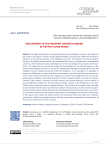
Development of the Philippine tourism economy in the post-COVID period
Статья научная
The object of research is the tourism industry of the Philippine economy. The subject of the study is the degree of impact of the global pandemic caused by the COVID-19 coronavirus infection on the tourism industry of the Philippine economy. The epidemic has had a negative impact on the global tourism industry and jeopardized the recovery of destinations in developing countries, which have faced great challenges due to the increasingly serious waves of the pandemic. The study aims to examine the impact of the pandemic on the tourism industry in the context of developing countries, as well as the multifaceted challenges and opportunities for the Philippine tourism industry during the COVID-19 pandemic. As an example, it is advisable to choose the Philippines, a country that before the pandemic was one of the fastest growing economies in the world, has moved into the category of countries heavily affected in the current epidemiological conditions. The article discusses the state measures taken to restore the tourism industry of the country's economy, and also analyzes the existing domestic tourism market to present effective strategies for the development of this industry in the Philippines in the postCOVID period, taking into account regional specifics. The results of the analysis made it possible to assume that crisis situations not only have negative consequences, but also provide an opportunity for the formation of new directions for the development of the tourism sector. In this article, we explore how the tourism industry may develop in the Philippines in the post-COVID period. In the course of the study, the author came to the conclusion that in the short term, domestic agricultural, medical and religious tourism will play a vital role in supporting the initial phase of the recovery of this sector of the economy.
Бесплатно
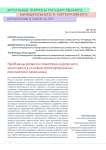
Development problems of resort complex in transformation of the Russian economy
Статья научная
At the modern development level of the socioeconomic system in Russia in the conditions of a stable transition to the principles and provisions of the digital economy and a new technological order, more attention is paid to the structural solution of the problems of conducting economic activity in all sectors of the national economy. Structuring the problems of the resort complex is an important stage of a strategy for the development of this sphere in our country. The authors designate the maim stages of this prosses, namely the collection of information on the current state of the object under study in resort complex, the description and analysis of the results of the study, the generalization and systematization of the results of the study, and the development of methodological recommendations for resolving the identified problems. The infrastructure problems, legal problems, social problems, economic problems complex should be recognized as most characteristic structural problems in the activity of the recreation. Economic problems, mainly, are only a natural consequence of the above three enlarged blocks of problems. We can say that their solution will reduce the impact of economic problems on the development of the resort complex. As the main problems of the regional development of the resort complex, the authors highlight difficulties with the uniform provision of access to treatment for specific types of diseases, the issue of transport accessibility, different levels of population density and the process of accelerated urbanization in the Russian regions. The obtained results of the presented analytical research can be used both for the formation of regional programs for the resort complex development and for the purpose of increasing the competitiveness of the market in specific municipal areas, taking into account the management policy of the resort complex on the basis of the principles of sustainable development.
Бесплатно
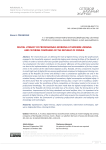
Статья научная
The research focuses on defining the level of digital literacy among the professionals engaged in the hospitality segment, specifically lodging and catering facilities of the Republic of Crimea in order to achieve their best possible performance and extend the field of their productive employment; the latter contributes to the greater efficiency of the performance potential use due to the implementation of advanced technologies and accommodation of its key components in the context of the information (digital) society. Notably, the key components required to reach high level of digital literacy among professionals employed at lodging and catering companies of the Republic of Crimea and develop it into a competence applicable not only in the professional scope, but also in daily life include information literacy, computer literacy, communication literacy, attitude to technological innovations, digital consumption and digital safety. It has been found that the components of digital literacy play a major role in building a professional’s career under the conditions of fierce competition on the labour market or for access to professional knowledge. The conclusion has been made that the digital transformations in the economy of the Republic of Crimea and daily lives of its citizens make the driving force of the innovations, improvement of the living standards and social welfare; thus, it is important to be aware of the transformation towards new technologies while taking into consideration the components of digital literacy, of the re-education which helps acquire the competencies for the digital economy within the framework of continuing professional education and adopting new knowledge and technologies.
Бесплатно
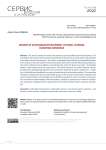
Drivers of sustainable development of rural tourism: European experience
Статья научная
This work is devoted to outline the practices of sustainable tourism development. The article gives the social, economic and environmental consequences as result of the unsustainable and chaotic tourism development. The author investigates the feasibility of sustainable development. Based on the international research and declarations forms of international organizations, this article elaborates the problems in interpreting the terms of “green economy”, “sustainable tourism” and various forms of rural tourism. The article discusses the main problems and the potential for sustainable development of rural tourism based on European experiences. In addition, it identified and justified the necessity of clustering of rural tourism products. The researcher attempts to explain the role of a stakeholder groups in the structure model of the national rural tourism cluster based on the principles of sustainable development. Hence, the goal is to preserve the environment systematically and participatory, leading to gaining socio-economic benefits. This experience is appropriate for supporting the transition towards a green economy sustainably.
Бесплатно
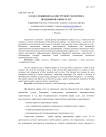
E-mail сообщение как инструмент маркетинга предприятий сферы услуг
Статья научная
Туристские компании - яркий пример предприятий сферы услуг, в деятельности которых сегодня наблюдается необходимость работы «на опережение», используя все имеющиеся возможности донесения до клиента уникальности своего продукта и услуг. Интернет становится наиболее перспективной площадкой для проведения маркетинговой кампании туристских предприятий. Статья посвящена выявлению новых методов проведения рекламной кампании на предприятиях сферы услуг - e-mail рассылки. Автор анализирует эффективность Интернет-обращений, приводит современные и действующие способы написания e-mail сообщений, показывает механизмы предотвращения спама.
Бесплатно
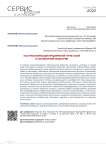
ESG-трансформация предприятий туристской и гостиничной индустрии
Статья научная
В статье рассматриваются ESG-принципы развития экономики, которые в полной мере отвечают концепции устойчивого развития. Ключевыми индикаторами современного предпринимательства является ответственное отношение к окружающей среде (E-критерий), соблюдение социальной ответственности бизнеса (S-критерий), качественное управление компанией (G-критерий). Многие предприятия из различных отраслей уже разделяют ESG-принципы и активно их используют в своей деятельности. Международные рейтинговые агентства разрабатывают ESG-рейтинги компаний, которые показывают степень приверженности предприятий этим принципам. Российские агентства также формируют рейтинговые ESG-оценки отечественных компаний. Однако это не относится к предприятиям индустрии туризма и гостеприимства, которые еще не прониклись идеями ESG-трансформации и не представлены в рейтингах. В статье выявлены причины, которые будут способствовать активной ESG-трансформации предприятий туристской и гостиничной индустрии, в том числе, изменения в политике предоставления ответственных инвестиций в основном компаниям с высоким ESG-рейтингом, обеспечение конкурентоспособности и привлекательности российских предприятий индустрии туризма и гостеприимства на мировом рынке услуг.
Бесплатно
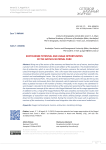
Ecotourism potential and usage opportunities of the Goygol national park
Статья научная
Being one of the sectors of the economy and based on the use of nature, tourism plays a pivotal role in the amelioration of the social welfare of the population. The fundamental function of ecotourism, which is one of the forms of tourism, preserve the natural, historical, and cultural heritage for future generations. This is the reason that ecotourism should scrutinise the conceptual directions of the quality improvement of the tourism services and their scientific-theoretical and methodological issues. One of the development directions of ecotourism is connected to the National Parks. The uniqueness of the National Parks paves the way for the tourists to visit them and continuously forms their demands, which implements mass tourism and brings about a gradual increase in the number of visitors. Principally, in this respect, the submitted research paper is devoted to the determination of the ecotourism potential of the region based on the improvement concept of the nature in the Goygol National Park and its usage opportunities. In addition to this, a map of the Goygol National Park was compiled, and ecotourism routes were provided in order to organize trips to the eye-catching areas of the National Park. Moreover, the advantages of ecotourism were examined in the article utilising foreign scientific experiences based on the comparative analysis method. During the research, the issues such as gaining momentum of the ecotourism, its motivation and integration into other areas were looked over.
Бесплатно
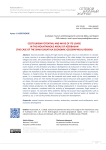
Статья научная
Tourism provides a basis for high income and quick return on investment. In a broader sense, tourism is a means affecting the formation of the state budget, the improvement of villages and cities, the preservation of historical and architectural monuments, and the development of small and medium enterprises. The mountainous areas of Azerbaijan are spectacular in terms of tourism, especially ecotourism. Because natural conditions and resources have a decisive impact on the formation and future development of ecotourism in these areas. This increases the strength of the socio-economic development of villages in mountainous areas and affects the importance of the relationship between tourism and the environment (ecotourism). However, in modern times, the level of use of natural tourism resources in Azerbaijan is inadequate. It is commonly known that the material and social needs of the rural population in mountainous areas are met mainly through local natural resources and opportunities. In modern times, the main occupation of the population in the mountainous areas of the world's leading countries is based on the use of ecotourism resources. Because of the conditions of structurally limited production, the difficulty of finding employment in mountainous areas aggravates the situation, combined with the activity of demographic processes (high natural increase) in places. To overcome these problems taking into account local opportunities such as climatic conditions, landscapes, forest resources, mineral and thermal water of medical importance, etc. is one of the priority directions of ecotourism development.
Бесплатно
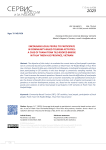
Статья научная
The objective of this study is to evaluate the current status of local people's participation in community-based tourism (CBT) activities at Thanh Toan Tile-Roofed Bridge in Thua Thien Hue, Vietnam. Research data were collected from 100 people, including 64 local people who have been participating in CBT activities in this area through a convenience sampling method. The study used descriptive statistics, frequency analysis, one-way ANOVA test, and Independent Samples T-test to answer the research questions. Research results show the difficulties of local people when participating in CBT activities such as tourism seasonality, low qualifications of local people, the division of benefits from community tourism activities, lack of capital, local people's dependence on tourism development projects, etc. Based on the research results, the study proposed some solutions to attract local people to participate in CBT activities at Thanh Toan TileRoofed Bridge.
Бесплатно
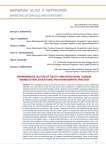
Статья научная
The ecological culture of the city and town is a systemic indicator of the relationship between man and nature on the territory of an urban settlement. It reflects the level (intensity) and direction of environmental activities of city residents and specialists working in various areas of urban economy and business, for the preservation and development of urban flora and fauna. An important part of the ecological culture of the city is associated with urban studies, caring for trees and plantations in the city and around it. Such care is carried out both directly, in the course of activities related to the protection and development of forest plantations, and in the context of related practices, including recreational and tourist. One of the most popular and relevant measures of modern life is the saturation of space and time of a person's life, a citizen with contacts with flora and fauna, including with the help of urban forest plantations. As for the residents of the city and the suburbs, then in their life it is, most often, mainly about micro-tourism or weekend tourism. For tourists - city visitors - getting to know the city's planted forests can be an important part of their journey. The aim of the study is to analyze the problems of the ecological culture of the city in the context of the tasks of recreational tourism and related health, educational and environmental practices. The purpose of the study is carried out on the example of understanding the problems, opportunities and areas of activity in relation to the leading aspect of urban ecological culture - urban forest plantations. The research method is a theoretical analysis of the problems of the formation and development of the ecological culture of the city, the concerns of citizens and specialists about the flora and fauna of the city, its forest plantations, in the context of the tasks of recreational tourism and related health, educational and environmental practices. As the study showed, on the basis of urban forest plantations, educational, recreational and environmental activities of different groups of citizens and tourists from other regions can be and are being implemented. Urban forestry is a complex discipline about the development and functioning of forest areas located in close proximity or included in urban settlements, and is also an important part of modern recreational geography. Hikes in the forest, which are and are not part of purposeful and systemic recreational, including tourist activities, are the most important means of maintaining the psychological, physical and other components of the health of citizens in the process of implementing recreational and health-improving and educational and environmental practices. This creates an opportunity for a person and society to survive and develop even in conditions of intense, uncontrolled technological changes.
Бесплатно
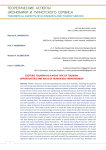
Esoteric tourism as a niche type of tourism: opportunities and ways of human self-improvement
Статья научная
Modern tourism is actively expanding the scope of its activities, including through the ever-increasing diversification and specialization of tourist trips and other products. Niche tour-ism is beginning to become an increasingly important sphere of tourism, annually giving a huge increase even in those areas that were traditionally considered massive. But there are also areas that have never been and can never be massive. These include esoteric tourism. Of course, there is an old tradition of pilgrimages and religious tourism, however, the concept of "esoteric" implies secret, sacred knowledge and skills that are passed on to some, a select few or, in the case of tourists, seeking them. The condition for obtaining this knowledge and skills is self-improvement and self-realization. As a result, esoteric tourism acts as a classic niche type of tourism. Its pur-pose as a type of tourism of special interests is self-improvement and self-realization as a motive of tourist activity. The purpose of the work is to study the state and prospects for the develop-ment of esoteric tourism as a special type of niche tourism, study the specifics of esoteric tourism as a type of niche tourism and identify the prospects for its development in Russia and the world. This type of tourism is intended for tourists with a special type of needs: in the context of A. Maslow's hierarchical model of needs, tourists who demand routes and other tourist offers of this type belong to a group of people who require a special quality of impressions about the world, and, most importantly, about themselves... The tourist travel of such tourists is the inte-gration of health-recreational (healing), cultural and educational (philosophical and esoteric) and extreme mystical (spiritual, magical, shamanistic, etc.) travel. Self-improvement and self-realization as a motive of tourist activity represent the highest level of motivation for tourist activity and, therefore, one way or another, should be understood as elite tourism, along with extreme tourism. This type of tourism has great development prospects precisely as a niche type of tourism, since it involves a person's work with oneself: the organization of such work requires significant efforts on his part and on the part of the organizers of a tourist trip, therefore, not only highly qualified specialists and special tourist destinations are needed, but also flexible, mul-ticomponent routes, allowing to implement special customer requests so that this type of busi-ness remains not only in demand, but also competitive, along with its immanent elitism and other specifics.
Бесплатно
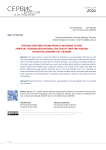
Статья научная
This paper aims to study the influence of factors on young people's decisions to visit Linh Ung Pagoda in Son Tra, Danang city, Vietnam. Research data were collected from 240 students currently studying at universities in Vietnam through a convenience sampling method. In the study, several research methods were used such as descriptive statistics, exploratory factor analysis (EFA), and multiple linear regression analysis. The results of the study show that two factors influenced young people's decisions to visit Linh Ung Pagoda in Son Tra, including (1) travel motivation and (2) the costs of the trip. Through research results, this paper has proposed some important recommendations to promote young people's choice to visit spiritual tourism destinations.
Бесплатно
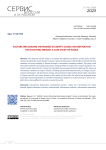
Статья научная
The objective of this study is to analyze the influence of factors on the choice of Vietnamese students for study abroad in Russia. Research data were collected from 210 Vietnamese students currently studying in Russia through a convenient sampling method. The study used descriptive statistics and exploratory factor analysis (EFA) to answer the research questions. Research results show that 31 criteria are classified into 5 groups of factors affecting the choice of Vietnamese students to study in Russia, including (1) personal improvement, (2) images of educational institutions, (3) destination image, (4) promotional information about higher education in Russia, and (5) cost issues. Based on the results of the study, the article has proposed some important recommendations to motivate Vietnamese students to study in Russia as well as students from many different countries around the world.
Бесплатно
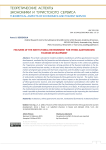
Features of the institutional environment for ethno-gastronomic tourism development
Статья научная
This article is devoted to modern problems and features of ethno-gastronomic tourism development, mediated by the formation and development of socio-economic institutions of the tourism sector. Modern development trends in the tourism industry in the context of updating the "experience economy" and ensuring a strong position of the Russian Federation in the domestic and world tourism market, on the one hand, determine the priority direction of the formation of original types of tourism that have uniqueness and the ability to gain new knowledge. On the other hand, the formation of a new direction of tourism activities will create a platform for the development of individual regions and industries through the consolidation of state, public and private institutions for the functioning of ethno-gastronomic tourism. The author investigates the main institutional factors that have a direct impact on the formation of institutions of ethno-gastronomic tourism, and also highlights institutional contradictions that reflect the imperfection of the institutional environment for the functioning of ethno-gastronomic tourism, limiting the sustainable development of tourist territories on its basis. A retrospective analysis of the institutional environment for the formation and development of ethno-gastronomic tourism made it possible to formulate institutional problems and measures for improving the institutional structure of the formation and development of ethno-gastronomic tourism.
Бесплатно
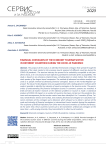
Статья научная
The purpose of the study is to identify the financial contagion that spread through the channels of the stock market in the economy tourist segment of different countries during the COVID-19 pandemic. The tourism industry has proved to be extremely susceptible to the pandemic shock, so it is necessary to have objective quantitative estimates of this susceptibility. The study is based on an extensive empirical base, including data on stock indices that reflect the stock quotes of the largest travel companies. The method of advanced correlation analysis was used as a specific method of detecting financial contagion, based on the Forbes-Rigobon approach. The classic Forbes-Rigobon test was supplemented with a sliding dynamic method, which made it possible to identify the intensity of country contagion in the tourism sector. The peculiarities of understanding the financial contagion essence in economic systems are revealed. A brief overview of modern research on the infection problems in tourism is made. A statistical analysis of COVID-19 impact on a number of countries has been carried out, the pandemic features and consequences for the tourism sector have been identified. For 5 countries (China, Taiwan, Great Britain, Greece and Turkey), test statistics for financial contagion are calculated. Dynamic estimates of the contagion were obtained, which allowed us to obtain a picture of the scale and intensity of financial contagion in international tourist markets during the pandemic. The recipients of financial infection from China were the tourist markets of Taiwan and Greece. At the same time, these countries turned out to be transmitters of financial contagion at the same time - with varying intensity, they transmitted it to other tourist markets.
Бесплатно
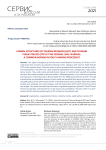
Статья научная
This paper investigates if and how the Formal Research Structures in Tourism / EFIT, understood here as forms of organized collective action, dialogue with Tourism Public Policies / TPP at the national level. Collective action is often associated with activities carried out by formal organizations. The EFITs are a type of formal organization and, consequently, a type of collective action. They collect data and information based on technical and scientific knowledge that they then make available to decision-makers. Methodologically, on one side we consider the existing tourism research groups in Brazil registered in the CNPq group directory as EFIT. Through a quantitative and qualitative analysis of their profile we identified their degree of activity in tourism public policy. On the other hand, the TPP, at the federal level, were surveyed. These two subsets of data were analyzed, via content analysis, and the intersection of EFIT with TPP and vice-versa was sought. The results show that there has been a significant expansion of both EFIT and TPP over the last two decades, and that both are in the process of consolidation. However, there is no intersection of EFITs with the political cycle of PPTur in Brazil, at the national level.
Бесплатно
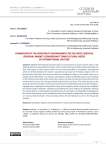
Статья научная
Efficient international and intercultural communication to a great extent relies on the ability to welcome representatives of one nation on the territory of another nation with due kindness and respect to their culture which can be simply described as hospitality. Ethnocultural needs are directly linked to the visitors’ expectations and make a tremendous impact on the impression they have from the service as well as on molding an image of the visited country or a specific tourist destination. For instance, developing a special hospitality product corresponding to the ethnocultural needs of the visitors from Japan may help increase the tourist flow from this country and raise it to the level of tourist flows from China and Korea. The article focuses on the study of international visitors’ ethnocultural needs in the hospitality industry and sets the following objectives: studying the ethnocultural needs of the Japanese while analyzing their traditions and communicative behavior; studying and analyzing the basic notions of hospitality; defining the impact factors of ethnocultural peculiarities on the perception of hospitality; developing offers on the improvement of the hospitality product for foreigners; elaborating recommendations on communicative behavior when providing service for international tourists in the hospitality industry.
Бесплатно
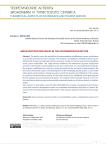
Green certification issues in the accommodation sector
Статья научная
The article covers the possibility of accommodation establishments green certification as a tool for greening the tourist industry. The analysis is provided for available statistics of certified hotels in Russia and abroad and the conclusion is made on the low level of accommodation sector green certification. The major barriers hindering the widespread of green certification practice in the Russian accommodation sector were researched. It is concluded that the feasibility of green certification as a tool for tourism greening on the one hand is determined by the level of environmental culture and development of the knowledge-based system on the certification goals and procedures among consumers and by the position of certification in the company's external communications system. On the other hand, by the availability of this greening tool for the majority of tourist market participants. The need for more thorough research on the content and factors determining environmentally responsible behavior of Russian tourists is substantiated.
Бесплатно
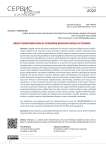
Green transformation of consumer behavior model in tourism
Статья научная
Insights into the directions and factors for travelers consumer behavior green transformation influence not only the success of travel companies business models innovative green modernization, their market competitiveness, ability to adapt to changes in natural environment and climate, but also the possibility of creating effective mechanisms promoting green behavior of consumers and manufacturers as well as implementation of regional and national strategies, programs and plans for sustainable development. The research was aimed at developing a model for tourist product consumers green behavior as a tool for the tourist industry environmental transformation in the face of growing environmental risks and challenges. Based on the analysis of approaches existing in the national and foreign theoretical definition of the consumer behavior essence and modeling, the identification of factors and current trends in the consumer behavior green transformation, the author's definition of the tourist green behavior and factorial concept model for the tourist product consumer behavior green transformation are proposed. The research theoretical background includes national and foreign scientific papers on tourist product consumer behavior environmental transformation, determining conditions and ways for the transition to a 'green' economic growth, and sustainable development of the tourist industry. The research data background includes analytical and statistical reports of international tourist and nature protection institutions, governmental and nongovernmental analytical centers, governmental statistical service official data, the data of tourist market entities surveys, published case studies, including the analysis of tourist market entities activities. Applied methods of informational monitoring and analysis of national and international scientific databases, systemic analysis, synthesis, patterns identification allowed to make reasonable conclusions. The publication was prepared under the implementation of issue No 1021052404499-3-5.2.1 Theoretical and methodological foundations for the strategic management of the RF recreational and tourist sector innovative development of the FRC SSC RAS state assignment.
Бесплатно
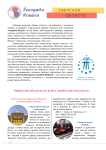
INCOGNITA ROSSICA: Тверская область
Другой
Редакция журнала «Сервис в России и за рубежом» с текущего номера инициирует специальную рубрику журнала под названием «Incognita Rossica». В ней будут публиковаться подборки информа-ционных материалов о туристских ресурсах, достопримечательно-стях, актуальных событиях и особенностях развития услуг госте-приимства в отдельных регионах – субъектах Российской Федерации (Rossica – буквально «относящееся к России»). Приглашаем региональные туристские органы власти, ту-ристские информационные центры, краеведов, идеологов развития туризма в регионах присылать в редакцию информационные мате-риалы для новой рубрики. Давайте вместе раскрывать туристский потенциал нашей страны, изучать и исследовать Incognita Rossica! Сегодня новую рубрику мы посвящаем Тверской области – ре-гиону, расположенному на севере Центрального федерального окру-га Российской Федерации. Площадь региона составляет 84,2 тыс. км2, что больше таких стран, как Австрия, Чехия, Ирландия, Швей-цария, Нидерланды, Бельгия, Грузия, стран Прибалтики и др. Твер-ская область – очень интересный для туристов регион. Об этом – нижеследующие материалы, которые любезно подготовил для нашего журнала Виктор Михайлович Грибков-Майский – член Союза журналистов России, Главный специалист – эксперт Министерства туризма Тверской области.
Бесплатно

